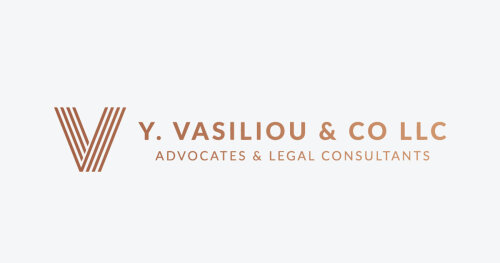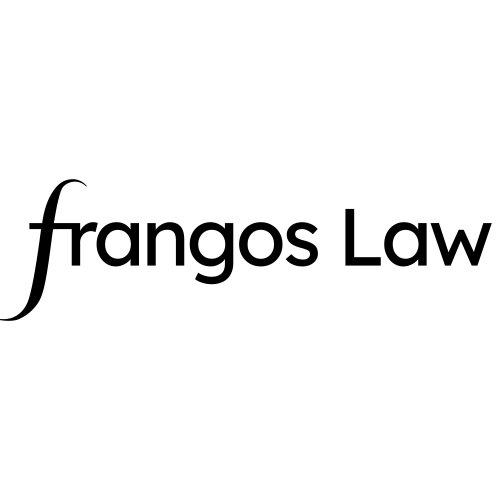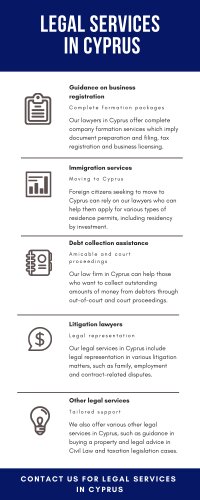Best Landlord & Tenant Lawyers in Larnaca
Share your needs with us, get contacted by law firms.
Free. Takes 2 min.
Free Guide to Hiring a Real Estate Lawyer
List of the best lawyers in Larnaca, Cyprus
About Landlord & Tenant Law in Larnaca, Cyprus
The relationship between landlords and tenants in Larnaca, Cyprus is governed by a variety of legal frameworks designed to ensure fair treatment for both parties. This legal domain covers everything from lease agreements and rental payments to tenant rights and landlord obligations. Understanding these laws is crucial for both landlords and tenants to avoid disputes and to ensure their rights are protected.
Why You May Need a Lawyer
Engaging a lawyer can be beneficial in various situations related to Landlord & Tenant in Larnaca. Common scenarios where legal assistance might be necessary include:
- Drafting or reviewing lease agreements to ensure they comply with local laws.
- Handling disputes related to rent payments, property damages, or eviction proceedings.
- Navigating the legalities surrounding rent control and rental increases.
- Ensuring compliance with health and safety regulations.
- Resolving issues involving tenant rights and landlord responsibilities.
Local Laws Overview
Landlord & Tenant law in Larnaca is influenced by both national and local regulations. Key aspects to be aware of include:
- Lease Agreements: These must be documented in writing to be legally enforceable and should clearly outline the terms of the tenancy.
- Rent Control: There are regulations concerning the amount of rent that can be charged and the conditions under which it can be increased.
- Tenant Rights: Tenants have protections regarding eviction and must be given appropriate notice and reasons for any termination of their lease.
- Landlord Obligations: Landlords are required to maintain the property in a habitable condition and comply with safety standards.
- Dispute Resolution: There are formal processes in place for resolving disputes between landlords and tenants, often necessitating legal intervention.
Frequently Asked Questions
What is the minimum notice period for eviction?
The minimum notice period for eviction depends on the terms of the lease agreement but typically ranges from one to three months.
Can the landlord increase the rent at any time?
No, rent increases must usually comply with rent control regulations which provide for limited and documented increases.
What can I do if my landlord is not making necessary repairs?
Tenants can formally request the repairs in writing. If the landlord still does not comply, tenants may seek legal recourse or contact relevant governmental bodies.
Is a verbal lease agreement valid in Larnaca?
While verbal agreements are technically valid, they are not advisable as they are difficult to enforce. A written lease agreement is strongly recommended.
What should a lease agreement include?
A lease agreement should include the rental amount, duration of the lease, terms of payment, responsibilities for repairs, and procedures for ending the lease.
What are my rights if the landlord decides to sell the property?
Tenants generally have the right to continue their lease under new ownership unless the sale agreement states otherwise. Always review the lease for any clauses related to this scenario.
How can I legally terminate my lease early?
The conditions for early termination should be specified in the lease agreement. Otherwise, negotiating with the landlord or compensating for breach of lease may be required.
What happens if I refuse to pay rent due to unresolved complaints?
Refusing to pay rent can lead to legal action. It's better to seek alternative dispute resolution methods or legal advice to handle such situations.
Can my landlord enter the property without notice?
Landlords must generally provide reasonable notice before entering the property, except in emergencies.
What should I do if I face illegal eviction?
If facing illegal eviction, tenants should immediately seek legal assistance to protect their rights and possibly file a complaint with the local authorities.
Additional Resources
For more information and assistance, consider reaching out to the following resources:
- Cyprus Bar Association
- Ministry of Interior
- Local Municipal Offices
- Consumer Protection Service
Next Steps
If you need legal assistance in the field of Landlord & Tenant in Larnaca, here are some steps you can take:
- Document all communications and any issues related to your tenancy.
- Consult with a qualified lawyer who specializes in Landlord & Tenant law.
- Review your lease agreement and any relevant local laws to understand your rights and obligations.
- If necessary, contact local authorities or tenancy dispute resolution services for further support.
Taking these steps can help you navigate Landlord & Tenant issues more effectively and safeguard your rights and interests.
Lawzana helps you find the best lawyers and law firms in Larnaca through a curated and pre-screened list of qualified legal professionals. Our platform offers rankings and detailed profiles of attorneys and law firms, allowing you to compare based on practice areas, including Landlord & Tenant, experience, and client feedback.
Each profile includes a description of the firm's areas of practice, client reviews, team members and partners, year of establishment, spoken languages, office locations, contact information, social media presence, and any published articles or resources. Most firms on our platform speak English and are experienced in both local and international legal matters.
Get a quote from top-rated law firms in Larnaca, Cyprus — quickly, securely, and without unnecessary hassle.
Disclaimer:
The information provided on this page is for general informational purposes only and does not constitute legal advice. While we strive to ensure the accuracy and relevance of the content, legal information may change over time, and interpretations of the law can vary. You should always consult with a qualified legal professional for advice specific to your situation.
We disclaim all liability for actions taken or not taken based on the content of this page. If you believe any information is incorrect or outdated, please contact us, and we will review and update it where appropriate.
















